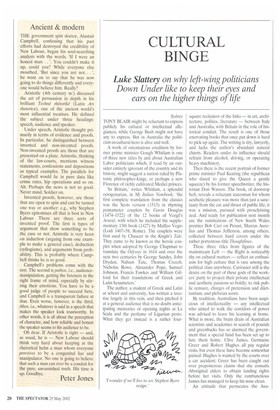Ancient & modern
THE government spin doctor, Alastair Campbell, confessing that his past efforts had destroyed the credibility of New Labour, began his soul-searching analysis with the words, 'If I were an honest man. . . '. You couldn't make it up, could you? While everyone else mouthed, 'But since you are not. . . he went on to say that he was now going to do things differently and everyone would believe him. Really?
Aristotle (4th century BC) discussed the art of persuasion in depth in his brilliant Techne rhetorike (Latin Ars rhetorica), one of the ancient world's most influential treatises. He defined the subject under three headings: speech, audience and speaker.
Under speech, Aristotle thought primarily in terms of evidence and proofs. In particular, he distinguished between invented and non-invented proofs. Non-invented proofs are those that are presented on a plate. Aristotle, thinking of the law-courts, mentions witness statements, confessions and depositions as typical examples. The parallels for Campbell would lie in pure data like crime rates, hip operations and so on. Ah. Perhaps the news is not so good. Never mind. Soldier on.
Invented proofs, however, are those that are open to spin and can be turned one way or another: e.g., why Stephen Byers epitomises all that is best in New Labour. There are three sorts of invented proof. The first is types of argument that show something to be the case or not. Aristotle is very keen on induction (arguing from one example to make a general case), deduction (syllogisms), and arguments from probability. This is probably where Campbell thinks he is so good.
Campbell's problems come with the rest. The second is pathos, i.e., audiencemanipulation, getting the listeners in the right frame of mind, especially by stirring their emotions, You have to be a good judge of people to succeed here, and Campbell is a transparent failure at that. Even worse, however, is the third, ethos, i.e., whatever is said in a speech that makes the speaker look trustworthy. In other words, it is all about the perception of character, and how reliable and honest the speaker seems to his audience to be.
Oh dear. If Aristotle is right — and, as usual, he is — New Labour should think very hard about keeping at the rhetorical helm a man whom everyone perceives to be a congenital liar and manipulator. No one is going to believe that such a man can ever he a conduit for the pure, unvarnished truth. His time is up. Goodbye. Peter Jones






















































































 Previous page
Previous page